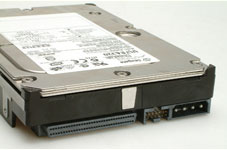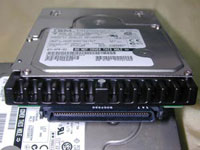An acronym for Small Computer System Interface. This interface was introduced as a method of connecting multiple peripherals to computers. Based on a parallel bus structure, with each device having a unique ID (or address), the SCSI bus will support up to seven devices plus the host adapter. Newer ‘wide’ interfaces, used almost exclusively for hard drives, can support up to 15 devices plus the host controller, and can transfer data at burst speeds of up to 320 MB/sec. Because of the multiple device support and extended cable length (up to 6 meters for SCSI-2), the higher transfer rate, and the ability to install multiple host adapters on the motherboard or in available connectors, the SCSI interface is used most often to connect external devices such as scanners, CD-ROMs, CD duplicators, and multi-drive storage enclosures, while at the same time connecting to SCSI devices internally, usually on the same adapter.
Although SCSI is an ANSI standard, there are many variations of it, so two SCSI interfaces may be incompatible. For example, SCSI supports several types of connectors.
The following varieties of SCSI are currently implemented:
• SCSI-1: Uses an 8-bit bus, and supports data rates of 4 MBps.
• SCSI-2:Same as SCSI-1, but uses a 50-pin connector instead of a 25-pin connector, and supports multiple devices. This is what most people mean when they refer to plain SCSI.
• Wide SCSI: Uses a wider cable (168 cable lines to 68 pins) to support 16-bit transfers.
• Fast SCSI: Uses an 8-bit bus, but doubles the clock rate to support data rates of 10 MBps.
• Fast Wide SCSI: Uses a 16-bit bus and supports data rates of 20 MBps.
• Ultra SCSI: Uses an 8-bit bus, and supports data rates of 20 MBps.
• SCSI-3: Uses a 16-bit bus and supports data rates of 40 MBps. Also called Ultra Wide SCSI.
• Ultra2 SCSI: Uses an 8-bit bus and supports data rates of 40 MBps.
• Wide Ultra2 SCSI: Uses a 16-bit bus and supports data rates of 80 MBps.
If your data on the SCSI drive has been overwritten by new content, then the chance to recover them will be little. For better data security of the SCSI hard drive, acedatalab provides system backup & restore, hard disk or partition backup & restore, disk clone to protect your system and disk. It can back up whole PC, including the operating system plus your data, applications, settings and everything!





